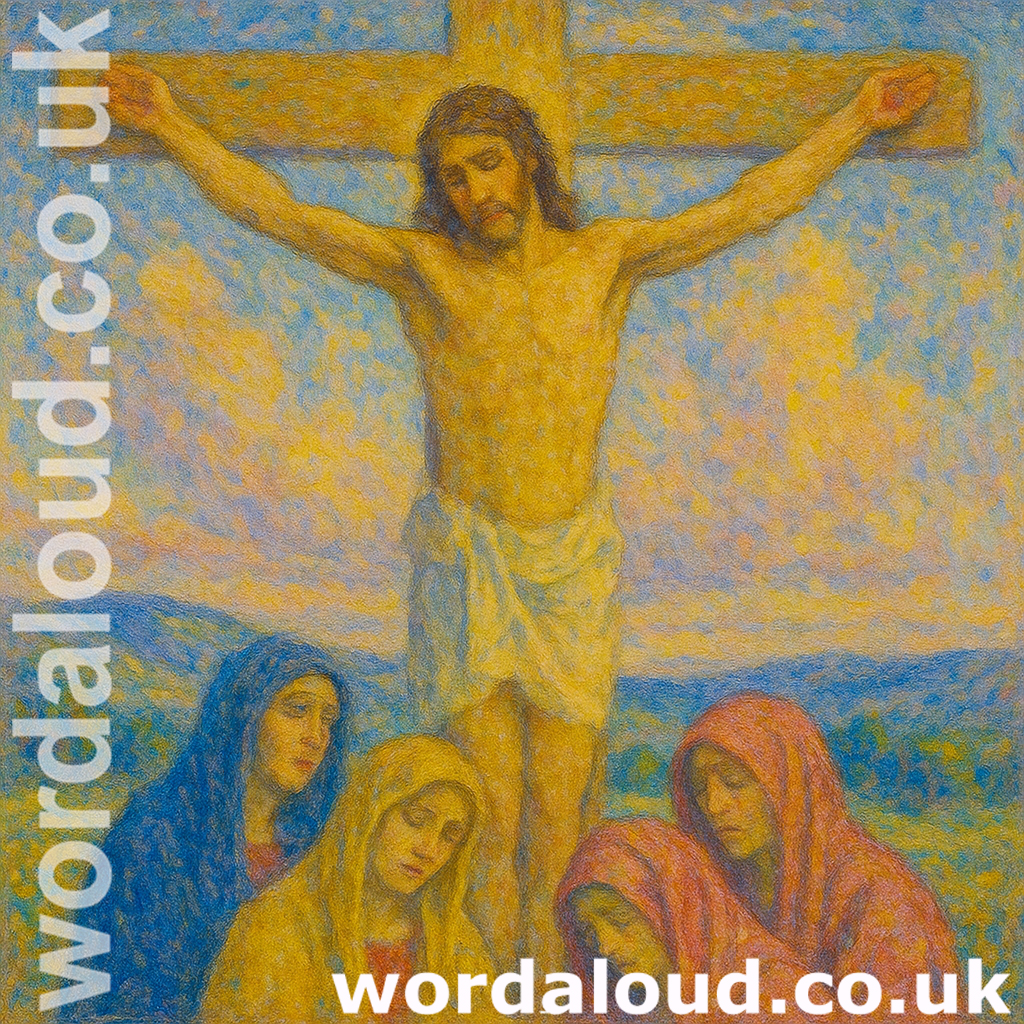Christian Art | Easter To Pentecost | Holy Spirit
Office Of Readings | Eastertide Week 7, Saturday | A Reading From An Unknown African Author Of The Sixth Century | The Church In Its Unity Speaks In Every Language | The Holy Spirit At Pentecost
‘The one Church in its unity speaks in every tongue.’
The Church In Its Unity Speaks In The Language Of Every Nation
This remarkable 6th century reflection from an anonymous African author offers a rich theology of Pentecost, drawing together ecclesiology, pneumatology, and missiology with great pastoral clarity. Writing within the context of the post-Roman North African Church—one marked by persecution, doctrinal strife, and cultural transition—this author bears witness to a theology of hope, rooted in the enduring and unifying presence of the Holy Spirit.
Miracle Of Tongues | Pentecost And Universality
The author begins with the miracle at Pentecost: the disciples speaking in every language under heaven. This miraculous sign is more than a display of divine power—it is a theological declaration. Through the gift of tongues, God reveals that the Church is universal (katholikos), destined to speak to every culture, nation, and people. This miracle is not merely historical but emblematic: it manifests the birth of the Church as a truly catholic body, one that transcends ethnic, linguistic, and cultural boundaries.
In this reading, the gift of tongues is reframed not as a private spiritual phenomenon, but as a sign of unity—a divine charter for the Church’s mission. The presence of the Holy Spirit empowers communication across human divisions, reversing the confusion of Babel (Genesis 11:1–9) and establishing the unity of believers in Christ.
The Holy Spirit And The Language Of Love
The author shifts the emphasis from miraculous speech to the deeper reality it symbolises: love. The Holy Spirit, he says, is the one ‘by whom love is poured out in our hearts’, echoing Romans 5:5. This love is the true sign of the Spirit’s presence, uniting diverse individuals into the one body of Christ. In this, the reading aligns closely with the thought of Saint Augustine—himself a North African bishop—who taught that the Spirit is the bond of love between the Father and the Son, and thus the bond of unity in the Church.
Language, then, is not merely a verbal tool but a symbol of communion. As each believer is incorporated into the Church, they participate in her universality, speaking ‘in the tongues of all men’ through shared love and faith. The Church, as the body of Christ, speaks all languages because she is present in every culture and united by one Spirit.
New Wine In Fresh Skins | The Disciples Transformed
The author links Pentecost with Jesus’ parable: ‘No one puts new wine into old wineskins.’ (cf. Luke 5:37–38) The disciples, once timid and fearful, are now ‘renewed and made holy by grace’. The Holy Spirit is the new wine that expands and fills them, transforming their hearts and tongues.
This patristic image reflects a recurring theme in early Christian theology: the Spirit not only empowers but renews. As in Saint Cyril of Alexandria’s commentary earlier in the week, the indwelling Spirit changes the person from within. The disciples become signs of the renewed humanity, ‘fresh skins’ capable of receiving and bearing the ferment of divine life.
The Church As The Bride Of Christ
The author next employs the nuptial image of the Church as the bride of Christ, drawn from Ephesians 5 and Revelation 21. He emphasises fidelity: Christ never loses sight of his true bride, and no one can deceive him by substituting another. This poetic and pastoral image serves as a call to ecclesial unity and doctrinal integrity.
Amid a time when schisms threatened the Church’s unity—such as the Donatist controversy and later divisions over Christological doctrine—this assertion is significant. The Spirit unites the Church, and it is this unity that ensures the Church remains the true bride of Christ. In theological terms, this is an expression of the Church’s indefectibility: her essential identity remains intact through the Spirit’s abiding presence.
Unity In Love And The Bond Of Peace
The commentary ends with a quotation from Ephesians 4:2–3: ‘Bear with one another in love; do all you can to preserve the unity of the Spirit in the bond of peace.’ Here the author offers both a vision and a practical exhortation. The Spirit who unites us also demands our cooperation in maintaining that unity. Love is the foundation, and peace is the bond.
This passage anticipates later ecclesial teaching on unity and diversity, such as in Lumen Gentium and Unitatis Redintegratio from the Second Vatican Council. The unity of the Church is not uniformity but communion—a rich diversity of expressions held together by one faith, one baptism, and one Spirit.
Contemporary Relevance | Jesus Christ Today
Today, this 6th-century text speaks powerfully into the global and multicultural reality of the Church:
- In liturgy, the multilingual nature of Pentecost reminds us of the Church’s call to inculturate the Gospel in every land.
- In mission, it affirms that no culture is excluded from the reach of Christ’s saving love.
- In ecumenism, it challenges us to seek deeper unity in the Spirit while honouring legitimate differences.
- In social justice, the emphasis on mutual forbearance and peace calls the Church to be a witness of reconciliation in a fractured world.
This reading invites believers to become what they celebrate: a people renewed by the Spirit, joined in love, and sent to the world as the multilingual voice of Christ’s body.
Reflection | Love Revealed By Jesus Christ
The miracle of Pentecost is not confined to a single event. It is the ongoing reality of a Church that speaks every language, lives in every place, and radiates the love of God through the power of the Holy Spirit. As members of this body, we are called to unity, to witness, and to holiness—fresh wineskins for the ever-new wine of divine grace.
Let us, then, keep this feast not only with our voices but with our lives.

Office Of Readings | Eastertide Week 7, Saturday | A Reading From An Unknown African Author Of The Sixth Century | The Church In Its Unity Speaks In Every Language | The Holy Spirit At Pentecost
The disciples spoke in the language of every nation. At Pentecost God chose this means to indicate the presence of the Holy Spirit: whoever had received the Spirit spoke in every kind of tongue. We must realise, dear brothers, that this is the same Holy Spirit by whom love is poured out in our hearts. It was love that was to bring the Church of God together all over the world. And as individual men who received the Holy Spirit, speaks in the language of every people.
Therefore if somebody should say to one of us, “You have received the Holy Spirit, why do you not speak in tongues?” his reply should be, “I do indeed speak in the tongues of all men, because I belong to the body of Christ, that is, the Church, and she speaks all languages. What else did the presence of the Holy Spirit indicate at Pentecost, except that God’s Church was to speak in the language of every people?”
This way is the way in which the Lord’s promise was fulfilled: No one puts new wine into old wineskins. New wine is put into fresh skins, and so both are preserved. So when the disciples were heard speaking in all kinds of languages, some people were not far wrong in saying: They have been drinking too much new wine. The truth is that the disciples had now become fresh wineskins, renewed and made holy by grace. The new wine of the Holy Spirit filled them, so that their fervour brimmed over and they spoke in manifold tongues. By this spectacular miracle they became a sign of the Catholic Church, which embraces the language of every nation.
Keep this feast, then, as members of the one body of Christ. It will be no empty festival for you if you really become what you are celebrating. For you are the members of that Church which the Lord acknowledges as his own, being himself acknowledged by her, that same Church which he fills with the Holy Spirit as she spreads throughout the world. He is like a bridegroom who never loses sight of his own bride; no one could ever deceive him by substituting some other woman.
To you men of all nations, then who make up the Church of Christ, you the members of Christ, you, the body of Christ, you, the bride of Christ – to all of you the Apostle addresses these words: Bear with one another in love; do all you can to preserve the unity of the Spirit in the bond of peace. Notice that when Paul urges us to bear with one another, he bases his argument on love, and when he speaks of our hope of unity, he emphasizes the bond of peace. This Church is the house of God. It is his delight to dwell here. Take care, then, that he never has the sorrow of seeing it undermined by schism and collapsing in ruins.
Prayer With Jesus
Come, Holy Spirit, fill the hearts of your faithful,
and kindle in us the fire of your love.
You who speak in every language,
unite us in one faith, one hope, one baptism.
May we be faithful members of Christ’s body,
tongues of flame in a world of confusion.
Give us courage to bear with one another in love,
and grace to preserve the unity of the Spirit
in the bond of peace.
Through Christ our Lord. Amen.
Glossary Of Christian Terms
- Pentecost: The feast marking the descent of the Holy Spirit on the apostles, celebrated 50 days after Easter.
- Catholic (katholikos): From the Greek meaning ‘universal’; describes the Church’s openness to all peoples and cultures.
- Pneumatology: The theological study of the Holy Spirit.
- Inculturation: The process by which the Gospel is expressed in different cultural contexts.
- Donatism: A North African schism that argued sacraments were invalid if performed by unworthy ministers.
- Indefectibility: The Church’s divine guarantee to remain faithful to her essential nature and mission.
- Ecclesiology: The theological study of the Church.
- Missiology: The study of the Church’s mission to spread the Gospel.








